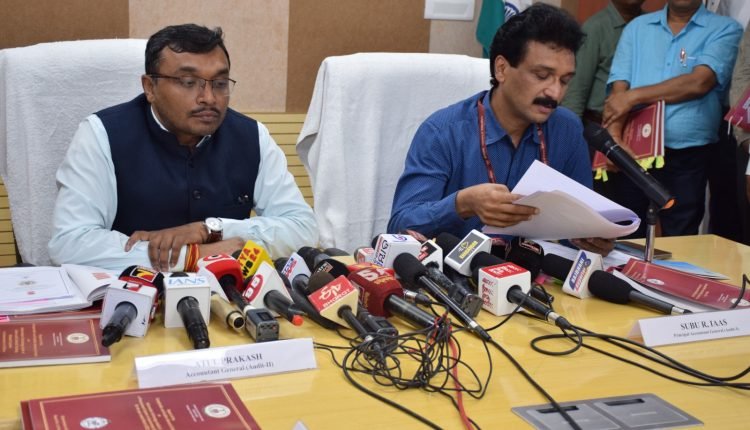Odisha’s Governance Crisis: A Tale of Lost Revenues and Stalled Development
Odisha’s ₹1,000 Crore Governance Collapse: Stalled Projects, Tribal Neglect, and AE-JE Mismanagement
In a scathing indictment of administrative inefficiencies, the Comptroller and Auditor General (CAG) of India’s Compliance Audit Report No. 2 of 2023 has uncovered systemic failures in Odisha’s governance, leading to over ₹1,000 crore in unrealized revenues, wasteful expenditures, and stalled development projects. The report, covering the period up to March 2023, scrutinizes tribal welfare agencies, education, water supply, and procurement processes, highlighting a pattern of procedural violations and poor oversight. Released under the Department of Scheduled Castes and Scheduled Tribes Development, it paints a picture of accountability deficits that undermine public funds and tribal upliftment.
Non-Realization of Land Lease Revenues in Mining Sector
A glaring irregularity involves the failure to recover ₹229 crore in government revenue from land leases. In the case of Mahanadi Coalfields Limited, lease agreements finalized in March 2023 resulted in excess compensation payments due to erroneous market value computations by Pur district revenue authorities. The valuation, inflated by ₹168.68 crore, stemmed from a flawed assessment of acquired land, leaving the government unable to realize dues. This lapse, attributed to “unrealistic approaches” in revenue estimation, exemplifies how computational errors cascade into massive financial shortfalls, depriving the state of vital resources for development.
Shortcomings in Private Run Special Schools for Tribals
The audit flagged eight sampled districts for non-compliance with Odisha Private Unaided Schools (OPUS) norms during 2018-23, revealing substandard facilities in 65 surveyed schools. In 23 districts, 35% of schools lacked basic infrastructure like classrooms, hygienic toilets, and safe drinking water, violating minimum standards under the Rights of Persons with Disabilities Act. Shortfalls extended to teaching aids, ramps for disabled students, and essential amenities such as beds and mosquito nets. In sampled schools, 36% and 37% respectively lacked adequate teaching staff and non-teaching personnel. These deficiencies, including inadequate teacher training and monitoring by the Scheduled Tribes and Scheduled Castes Development Department, compromise education for vulnerable tribal children, perpetuating inequality.
Implementation Failures in Rashtriya Uchchatar Shiksha Abhiyan (RUSA)
RUSA, aimed at higher education reforms, saw ₹699.84 crore utilization against ₹562.86 crore audited, but with glaring execution gaps. Out of six Model Degree Colleges (MDCs) and Skill Development Centres (SDCs) sanctioned at ₹523 crore, several remained incomplete or abandoned. For instance, an MDC in Kendujhar was stalled due to site conflicts, incurring ₹11.30 crore in wasted expenditure. Another SDC in Semiliguda cost ₹8.71 crore but was deemed unsuitable, leading to its abandonment. The audit notes that 158 educational institutions faced utilization shortfalls, underscoring delays and poor planning that hinder skill-building for tribal youth.
Procurement and Infrastructure Lapses in Tribal Agencies
Integrated Tribal Development Agencies (ITDAs) drew sharp criticism for procurement irregularities worth ₹709.47 crore across 11 sampled units from 2018-23. Only 40% of sampled ITDAs achieved efficiency in spending, with violations including non-adherence to the Societies Registration Act, 1860, risking ₹90 crore in unaddressed wasteful outlays. Junior Engineers (JEs) and Assistant Engineers (AEs) executed works without proper cost estimates, remitting funds to bank accounts bypassing OPWD Code guidelines. Personal transactions by JEs totaling ₹148.75 crore through banks and insurance bypassed public money controls, while 325 test-checked works lacked supporting invoices worth ₹3.37 crore. The Odisha State Cooperative Marketing Federation’s involvement in procurement further inflated costs without competitive bidding.
Rubber Plantations and Development Delays
In integrated tribal development, 1,743 acres of rubber plantations under ITDAs suffered from unscientific practices, resulting in non-viable yields and ₹17.71 crore in unrecovered processing investments. Loss of ₹6.4 crore to the Cutack Development Authority arose from unadjusted sub-lease consents on 50% of plots. Delays in broadcast policies by the Information and Public Relations Department led to ₹12.11 crore in excess ad spend on private channels, deviating from negotiated rates
Urban Water Supply Augmentation Shortfalls
The report exposes lapses in urban water projects under AMRUT and BASUDHA, with ₹208.7 crore from 2018-23 unutilized in 29 divisions. Water charges stood at 76-81% collection rates as of March 2023, far below targets. In 23 projects, delays in execution stemmed from design flaws, affecting 35% of works. Quality tests in 3,552 samples revealed contamination issues, including E. coli in 19% of locations. Solar-powered projects in 26 sites, installed in February 2020, deteriorated due to maintenance neglect, costing ₹21.74 crore.
These revelations demand immediate corrective action from Odisha’s administration to safeguard public funds and ensure equitable growth. The CAG urges stricter internal controls and timely audits to prevent recurrence.



Comments are closed.